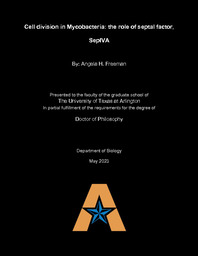
ATTENTION: The works hosted here are being migrated to a new repository that will consolidate resources, improve discoverability, and better show UTA's research impact on the global community. We will update authors as the migration progresses. Please see MavMatrix for more information.
Show simple item record
| dc.creator | Freeman, Angela H | |
| dc.date.accessioned | 2023-06-14T17:06:01Z | |
| dc.date.available | 2023-06-14T17:06:01Z | |
| dc.date.created | 2023-05 | |
| dc.date.issued | 2023-05-11 | |
| dc.date.submitted | May 2023 | |
| dc.identifier.uri | http://hdl.handle.net/10106/31236 | |
| dc.description.abstract | Today, about a quarter of the world’s population are infected with Mycobacterium tuberculosis (Mtb) and therefore, are at risk of developing tuberculosis (TB) disease. Tuberculosis, on average, takes about six months to treat, and even longer for those with drug resistant Mtb infections (World Health Organization, 2022). Extended treatment times for these infections are caused by the inherent tolerance to antibiotics
conveyed by mycobacteria’s distinct cell wall. Mycobacteria have a wide variety of cell wall regulators that help the cell adapt to stress, such as antibiotics. By understanding
how these regulators work, we can learn how mycobacteria evade killing by antibiotics.
This work aims to further investigate cell wall regulation. Specifically, we
characterize the cell division regulator, SepIVA. We begin by analyzing the posttranslational modifications on SepIVA and how they affect SepIVA function. We also study the effects of SepIVA protein depletion on different cytoplasmic cell wall precursor enzymes and polar elongation. Finally, we determine how SepIVA helps mycobacterial cells adapt to certain stressors, mainly DNA damage.
Our data led us to conclude that SepIVA is an activator of cell division and that arginine methylation on the N-terminus and C-terminus of SepIVA have differing roles in the cell cycle. We find that arginine methylation near the N-terminus of SepIVA
promotes its role in polar elongation, while the C-terminus largely functions in septation.
We characterize specific arginine residues that are crucial to SepIVA’s function in cell division as well as its response to DNA damage. Our results support the importance of cell wall regulation on the mycobacterial cell cycle and the treatment of TB. | |
| dc.format.mimetype | application/pdf | |
| dc.language.iso | en_US | |
| dc.subject | Cell divison | |
| dc.subject | bacteria | |
| dc.subject | molecular microbiology | |
| dc.subject | mycobacteria | |
| dc.subject | protein arginine methylation | |
| dc.subject | polar elongation | |
| dc.title | Cell division in Mycobacteria: the role of SepIVA | |
| dc.type | Thesis | |
| dc.date.updated | 2023-06-14T17:06:01Z | |
| thesis.degree.department | Biology | |
| thesis.degree.grantor | The University of Texas at Arlington | |
| thesis.degree.level | Doctoral | |
| thesis.degree.name | Doctor of Philosophy in Quantative Biology | |
| dc.type.material | text | |
| dc.creator.orcid | 0000-0002-7508-745X | |
Files in this item
- Name:
- FREEMAN-DISSERTATION-2023.pdf
- Size:
- 22.49Mb
- Format:
- PDF
This item appears in the following Collection(s)
Show simple item record


